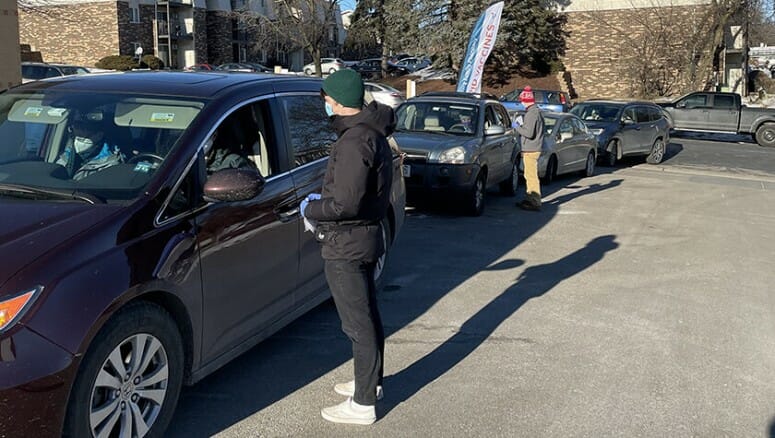22 Mar Pharmacy students meet urgent need for vaccinators in Wisconsin

Third-year PharmD students Nick Olszewski and Alex Peterson-Weber screen patients at Fitchburg Family Pharmacy before their COVID-19 vaccine injections. UW-MADISON SCHOOL OF PHARMACY
Through training, volunteerism and clinical rotations, the School of Pharmacy and its PharmD students meet an urgent need for COVID-19 vaccinators across Wisconsin.
“Right now, this is a huge public health priority, and we really need all hands on deck,” says Maggie Hoernke, a third-year PharmD student at the University of Wisconsin–Madison School of Pharmacy.
With second-year PharmD student Nikki Batterman, she has been recruiting and organizing student pharmacist volunteers to pitch in with the nationwide effort to roll out the newly approved vaccines for COVID-19.
Pharmacists and other health care providers are still responsible for their pre-pandemic work, while managing the additional influx of COVID-positive patients. To quickly and efficiently disperse vaccinations to all of Wisconsin’s eligible residents, the effort needs as many qualified individuals to get involved as possible.
Third- and fourth-year PharmD students are already trained vaccinators who are ready and willing to help. And, in preparation for the passing of Assembly Bill 4 extending vaccination capabilities to all trained student pharmacists, the School of Pharmacy moved the requisite training earlier in the curriculum and opened it up to first-year PharmD students, so they can begin pitching in, too.
Even PharmD students who haven’t yet gone through the training can play an important role — screening patients, educating them about the vaccine, and documenting who has received the vaccine, which type they were given, and when they need to return for their second dose.
“It’s a win-win,” says Hoernke. “We get practice educating patients and administering the vaccine, and we also get to help out the public. I think it will be really helpful.”



